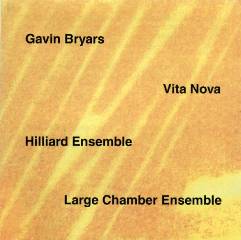Gavin Bryars – Vita Nova (1994)
Gavin Bryars – Vita Nova (1994)

1. Incipit Vita Nova, for male alto, violin, viola & cello (6:07) 2. Glorious Hill, for 4 voices (11:39) 3. Four Elements, ballet (28:53) 4. Sub Rosa, for recorder, clarinet, violin, double bass, vibraphone & piano (9:57) Performers: David James – alto, countertenor (1,2,3) Annemarie Dreyer – violin (1) Rebecca Firth – cello (1) Ulrike Lachner - viola (1) John Potter - tenor (2) Rogers Covey-Crump – tenor (2) Gordon Jones – baritone (2) Tim Payne – bass, drums (3) Glen Martin – guitar (3) Richard Martin – flugelhorn (3) Henrik Sienkiewicz - french horn (3) David Whitson – trombone (3) Christopher Swithinbank – piano (3) Gruffydd Owen - electric keyboard (3) Keith Bartlet – percussion (3) Chris Brannick – percussion (3) S. Alan Taylor - double bass (3) Jamie McCarthy – recorder (4) Roger Heaton – clarinet (4) Alexander Balanescu – violin (4) Martin Allen – vibraphone (4) John White – piano (4) Gavin Bryars - double bass (4)
Vita Nova includes four pieces by Bryars in which ECM appeared to be, at least partially, attempting to cash in on the new age-y vogue of the early '90s for the sort of quasi-medieval music made relatively popular by assorted singing monks, Arvo Pärt, and the Hilliard Ensemble with Jan Garbarek. Indeed, that latter group is on hand here to perform "Glorious Hill," and the results are as blandly attractive as the listener might guess given the following recipe: Take a mushily mystical text (in Latin), set to vaguely medieval sounding music, and spice with a dash of chromaticism and a pinch of minimalism. It's all handsomely produced and sung but terribly precious and overly palatable. How far Bryars had come from the rich reality of the tramp singing "Jesus' Blood Never Failed Me Yet" in his masterpiece from the '70s. Unfortunately, the remainder of the disc also fails to deliver much more than prettiness. The longest composition, "Four Elements," falls into the same gauzily impressionistic, rudderless rut of much of his '90s work, and the introduction of David James, the same countertenor used in "Incipit Vita Nova," seems tacked on just to fit in with the ostensible "medieval" feel of the album. The same applies to the use of a recorder on the final piece, "Sub Rosa." That work, however, does contain glimmers of the unique beauty and clarity of Bryars' earlier work as found on Hommages. But those instances are far too meager to be able to recommend this recording to anyone but listeners attempting to slowly crawl their way out of the new age morass. ---Brian Olewnick, Rovi
Last Updated (Monday, 07 August 2017 09:45)








